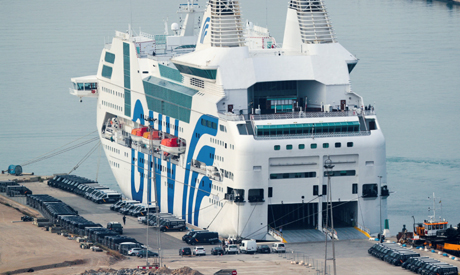
Lines of police vehicles are seen in front of a ferry ship rented by Spain's Interior Ministry to house hundreds of Spanish National Police and Civil Guard reinforcements sent to Catalonia ahead of the banned October 1 referendum at the port in Barcelona, Spain September 25, 2017 (Photo: Reuters)
The Spanish government said on Tuesday regional police will take control of any voting booths before a Catalan referendum on independence this weekend which it deems illegal.
For its part the Catalan regional government said the vote will go ahead and it sent out notifications to Catalans to man polling booths.
The row has plunged the country into one its biggest political crises since the restoration of democracy four decades ago.
Prime Minister Mariano Rajoy has said the referendum, which will ask Catalans if they wish the northeastern region to become an independent state, is against the law and the constitutional court has ordered it be halted while its legality is determined.
"Today we can affirm that there will be no effective referendum in Catalonia. All the referendum's logistics have been dismantled," the Spanish government's representative in Catalonia, Enric Millo, told reporters on Tuesday.
Catalonia's prosecutor has ordered the regional police -- known as the Mossos d'Esquadra -- to take control of any voting booths from Friday, a spokesman for the Madrid government's Catalan delegation said.
In an order to police issued on Monday, the prosecutor's office said they would take the names of anyone participating in the vote and confiscate relevant documents.
Anyone in possession of the keys or entrance codes to a polling booth could be considered a collaborator to crimes of disobedience, malfeasance and misappropriation of funds, the order said.
Senior Madrid government officials said on Monday that authorities had done enough to prevent a meaningful referendum in the region as Catalonia lacked an election commission, ballots boxes, ballot papers, a transparent census and election material.
The government has in recent weeks taken political and legal measures to prevent the referendum by exerting more control over the use of public funds in Catalonia, arresting regional officials and seizing election leaflets. Hundreds of police reinforcements, including the national Civil Guard, have been brought into Barcelona and other cities.
Madrid has also threatened fines against bureaucrats working on the ballot, including the region's election commission, which was dissolved last week.
These actions have provoked mass demonstrations and drawn accusations from Catalan leaders that the Madrid government was resorting to the repression of the Franco dictatorship.
They remain determined to hold the vote, saying the regional assembly in Barcelona will declare independence within 48 hours of a "yes" victory.
A "yes" vote is likely, given that most of the 40 percent of Catalans who polls show support independence are expected to cast ballots while most of those against it are not.
But the unrelenting opposition from Madrid means such a result would go all but unrecognised, potentially setting up a new phase of the dispute.
However, the Catalan government maintained on Tuesday that the vote would still take place.
It has sent out notifications to people planning to man polling booths spread across the region, the parliamentary spokeswoman for the separatist Junts pel Si party said on Tuesday.
Many had not yet received information about where or when they would be working after the state-run postal service was told to stop all mail related to the vote, Marta Rovira said in a radio interview.
Although Catalonia enjoys a certain measure of autonomy, separtists have long campaigned for independence for a wealthy region with its own language and cultural traditions. Unlike the now-diminished separatist struggle in the Basque Country, the movement has been largely non-violent.
Short link: